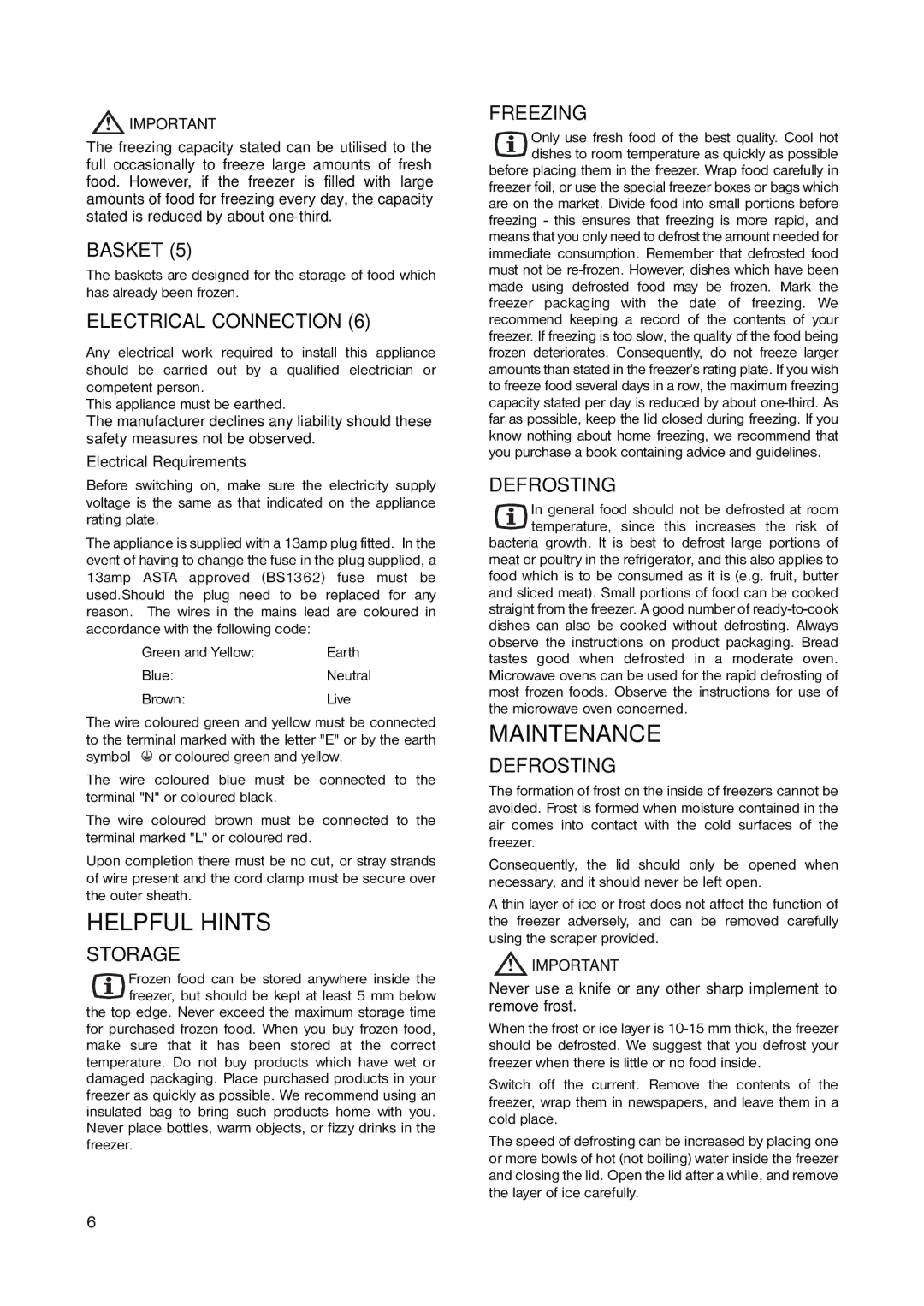
![]() IMPORTANT
IMPORTANT
The freezing capacity stated can be utilised to the full occasionally to freeze large amounts of fresh food. However, if the freezer is filled with large amounts of food for freezing every day, the capacity stated is reduced by about
BASKET (5)
The baskets are designed for the storage of food which has already been frozen.
ELECTRICAL CONNECTION (6)
Any electrical work required to install this appliance should be carried out by a qualified electrician or competent person.
This appliance must be earthed.
The manufacturer declines any liability should these safety measures not be observed.
Electrical Requirements
Before switching on, make sure the electricity supply voltage is the same as that indicated on the appliance rating plate.
The appliance is supplied with a 13amp plug fitted. In the event of having to change the fuse in the plug supplied, a 13amp ASTA approved (BS1362) fuse must be used.Should the plug need to be replaced for any reason. The wires in the mains lead are coloured in accordance with the following code:
Green and Yellow: | Earth |
Blue:Neutral
Brown:Live
The wire coloured green and yellow must be connected to the terminal marked with the letter "E" or by the earth
symbol ![]() or coloured green and yellow.
or coloured green and yellow.
The wire coloured blue must be connected to the terminal "N" or coloured black.
The wire coloured brown must be connected to the terminal marked "L" or coloured red.
Upon completion there must be no cut, or stray strands of wire present and the cord clamp must be secure over the outer sheath.
HELPFUL HINTS
STORAGE
Frozen food can be stored anywhere inside the freezer, but should be kept at least 5 mm below the top edge. Never exceed the maximum storage time
for purchased frozen food. When you buy frozen food, make sure that it has been stored at the correct temperature. Do not buy products which have wet or damaged packaging. Place purchased products in your freezer as quickly as possible. We recommend using an insulated bag to bring such products home with you. Never place bottles, warm objects, or fizzy drinks in the freezer.
FREEZING
Only use fresh food of the best quality. Cool hot dishes to room temperature as quickly as possible before placing them in the freezer. Wrap food carefully in freezer foil, or use the special freezer boxes or bags which are on the market. Divide food into small portions before freezing - this ensures that freezing is more rapid, and means that you only need to defrost the amount needed for immediate consumption. Remember that defrosted food must not be
you purchase a book containing advice and guidelines.
DEFROSTING
In general food should not be defrosted at room temperature, since this increases the risk of bacteria growth. It is best to defrost large portions of meat or poultry in the refrigerator, and this also applies to food which is to be consumed as it is (e.g. fruit, butter and sliced meat). Small portions of food can be cooked straight from the freezer. A good number of
the microwave oven concerned.
MAINTENANCE
DEFROSTING
The formation of frost on the inside of freezers cannot be avoided. Frost is formed when moisture contained in the air comes into contact with the cold surfaces of the freezer.
Consequently, the lid should only be opened when necessary, and it should never be left open.
A thin layer of ice or frost does not affect the function of the freezer adversely, and can be removed carefully using the scraper provided.
![]() IMPORTANT
IMPORTANT
Never use a knife or any other sharp implement to remove frost.
When the frost or ice layer is
Switch off the current. Remove the contents of the freezer, wrap them in newspapers, and leave them in a cold place.
The speed of defrosting can be increased by placing one or more bowls of hot (not boiling) water inside the freezer and closing the lid. Open the lid after a while, and remove the layer of ice carefully.
6
